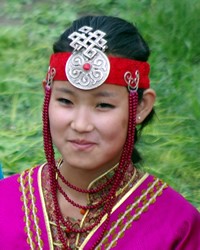Mongol, Khalka in Korea, South

Photo Source:
gradlon - Flickr
Creative Commons
|
Send Joshua Project a map of this people group.
|
| People Name: | Mongol, Khalka |
| Country: | Korea, South |
| 10/40 Window: | No |
| Population: | 36,000 |
| World Population: | 2,656,900 |
| Primary Language: | Mongolian, Halh |
| Primary Religion: | Buddhism |
| Christian Adherents: | 1.72 % |
| Evangelicals: | 1.20 % |
| Scripture: | Complete Bible |
| Ministry Resources: | Yes |
| Jesus Film: | Yes |
| Audio Recordings: | Yes |
| People Cluster: | Mongolian |
| Affinity Bloc: | East Asian Peoples |
| Progress Level: |
|
Introduction / History
The Khalkha are the largest group of Mongols in Mongolia. In fact, they are the core of all the Mongol peoples across northern Asia, including South Korea. The Khalkha Mongols consider themselves the direct descendants of Genghis Khan and therefore, the true preservers of Mongol culture. In the thirteenth century, Genghis Khan formed one of the greatest empires in world history by uniting all nomadic Mongol tribes and sending them out as conquering armies. For roughly 100 years, they conquered throughout Asia as far away as Korea where some of their descendants remain today. During the centuries that followed, the growing Russian and Chinese empires squeezed the once mighty Mongol Empire. In the early 1920s, Mongolia became a Marxist state until its quiet democratic revolution in 1990.
What Are Their Lives Like?
Some of the Khalka Mongols in South Korea have ancestors who arrived at the height of the Mongol Empire 700 years ago. Others came a migrants to take advantage of South Korea's robust economy. The greatest festival of the year for all Mongols is nadam, a word meaning "amusement." Mongols from far and wide gather for horse racing, wrestling, archery, and other games. Most likely, Mongolians who have migrated to South Korea continue this tradition.
What Are Their Beliefs?
The majority of Khalka Mongols in South Korea follow Tibetan Buddhism, also known as Lamaism. This form of Buddhism is blended with bon, a form of shamanism. They include magic and spirit appeasement in their spiritual lives.
What Are Their Needs?
The Mongol people in South Korea need to submit to Jesus Christ so they can experience the abundant life he offers in John 10:10. There are many vibrant South Koreans who can take Christ to these marginal Buddhists.
Prayer Points
Pray for the Lord to provide for their physical and spiritual needs as a testimony of his power and love. Pray that the Mongolian people will have a spiritual hunger that will open their hearts to the King of kings. Pray for workers who are driven by the love and boldness of the Holy Spirit to go to them. Pray for a movement to Christ among them to begin this decade.